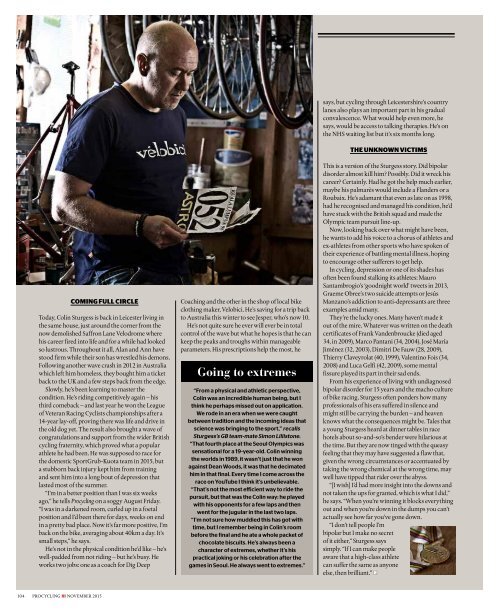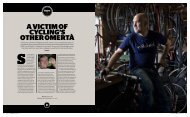Procycling Colin Sturgess
Create successful ePaper yourself
Turn your PDF publications into a flip-book with our unique Google optimized e-Paper software.
coming full circle<br />
Today, <strong>Colin</strong> <strong>Sturgess</strong> is back in Leicester living in<br />
the same house, just around the corner from the<br />
now demolished Saffron Lane Velodrome where<br />
his career fired into life and for a while had looked<br />
so lustrous. Throughout it all, Alan and Ann have<br />
stood firm while their son has wrestled his demons.<br />
Following another wave crash in 2012 in Australia<br />
which left him homeless, they bought him a ticket<br />
back to the UK and a few steps back from the edge.<br />
Slowly, he’s been learning to master the<br />
condition. He’s riding competitively again – his<br />
third comeback – and last year he won the League<br />
of Veteran Racing Cyclists championships after a<br />
14-year lay-off, proving there was life and drive in<br />
the old dog yet. The result also brought a wave of<br />
congratulations and support from the wider British<br />
cycling fraternity, which proved what a popular<br />
athlete he had been. He was supposed to race for<br />
the domestic SportGrub-Kuota team in 2015, but<br />
a stubborn back injury kept him from training<br />
and sent him into a long bout of depression that<br />
lasted most of the summer.<br />
“I’m in a better position than I was six weeks<br />
ago,” he tells <strong>Procycling</strong> on a soggy August Friday.<br />
“I was in a darkened room, curled up in a foetal<br />
position and I’d been there for days, weeks on end<br />
in a pretty bad place. Now it’s far more positive, I’m<br />
back on the bike, averaging about 40km a day. It’s<br />
small steps,” he says.<br />
He’s not in the physical condition he’d like – he’s<br />
well-padded from not riding – but he’s busy. He<br />
works two jobs: one as a coach for Dig Deep<br />
Coaching and the other in the shop of local bike<br />
clothing maker, Velobici. He’s saving for a trip back<br />
to Australia this winter to see Jesper, who’s now 10.<br />
He’s not quite sure he ever will ever be in total<br />
control of the wave but what he hopes is that he can<br />
keep the peaks and troughs within manageable<br />
parameters. His prescriptions help the most, he<br />
Going to extremes<br />
“From a physical and athletic perspective,<br />
<strong>Colin</strong> was an incredible human being, but I<br />
think he perhaps missed out on application.<br />
We rode in an era when we were caught<br />
between tradition and the incoming ideas that<br />
science was bringing to the sport,” recalls<br />
<strong>Sturgess</strong>’s GB team-mate Simon Lillistone.<br />
“That fourth place at the Seoul Olympics was<br />
sensational for a 19-year-old. <strong>Colin</strong> winning<br />
the worlds in 1989, it wasn’t just that he won<br />
against Dean Woods, it was that he decimated<br />
him in that final. Every time I come across the<br />
race on YouTube I think it’s unbelievable.<br />
“That’s not the most efficient way to ride the<br />
pursuit, but that was the <strong>Colin</strong> way: he played<br />
with his opponents for a few laps and then<br />
went for the jugular in the last two laps.<br />
“I’m not sure how muddied this has got with<br />
time, but I remember being in <strong>Colin</strong>’s room<br />
before the final and he ate a whole packet of<br />
chocolate biscuits. He’s always been a<br />
character of extremes, whether it’s his<br />
practical joking or his celebration after the<br />
games in Seoul. He always went to extremes.”<br />
says, but cycling through Leicestershire’s country<br />
lanes also plays an important part in his gradual<br />
convalescence. What would help even more, he<br />
says, would be access to talking therapies. He’s on<br />
the NHS waiting list but it’s six months long.<br />
the unknown victims<br />
This is a version of the <strong>Sturgess</strong> story. Did bipolar<br />
disorder almost kill him? Possibly. Did it wreck his<br />
career? Certainly. Had he got the help much earlier,<br />
maybe his palmarès would include a Flanders or a<br />
Roubaix. He’s adamant that even as late on as 1998,<br />
had he recognised and managed his condition, he’d<br />
have stuck with the British squad and made the<br />
Olympic team pursuit line-up.<br />
Now, looking back over what might have been,<br />
he wants to add his voice to a chorus of athletes and<br />
ex-athletes from other sports who have spoken of<br />
their experience of battling mental illness, hoping<br />
to encourage other sufferers to get help.<br />
In cycling, depression or one of its shades has<br />
often been found stalking its athletes: Mauro<br />
Santambrogio’s ‘goodnight world’ tweets in 2013,<br />
Graeme Obree’s two suicide attempts or Jesús<br />
Manzano’s addiction to anti-depressants are three<br />
examples amid many.<br />
They’re the lucky ones. Many haven’t made it<br />
out of the mire. Whatever was written on the death<br />
certificates of Frank Vandenbroucke (died aged<br />
34, in 2009), Marco Pantani (34, 2004), José María<br />
Jiménez (32, 2003), Dimitri De Fauw (28, 2009),<br />
Thierry Claveyrolat (40, 1999), Valentino Fois (34,<br />
2008) and Luca Gelfi (42, 2009), some mental<br />
fissure played its part in their sad ends.<br />
From his experience of living with undiagnosed<br />
bipolar disorder for 15 years and the macho culture<br />
of bike racing, <strong>Sturgess</strong> often ponders how many<br />
professionals of his era suffered in silence and<br />
might still be carrying the burden – and heaven<br />
knows what the consequences might be. Tales that<br />
a young <strong>Sturgess</strong> heard at dinner tables in race<br />
hotels about so-and-so’s bender were hilarious at<br />
the time. But they are now tinged with the queasy<br />
feeling that they may have suggested a flaw that,<br />
given the wrong circumstances or accentuated by<br />
taking the wrong chemical at the wrong time, may<br />
well have tipped that rider over the abyss.<br />
“[I wish] I’d had more insight into the downs and<br />
not taken the ups for granted, which is what I did,”<br />
he says. “When you’re winning it blocks everything<br />
out and when you’re down in the dumps you can’t<br />
actually see how far you’ve gone down.<br />
“I don’t tell people I’m<br />
bipolar but I make no secret<br />
of it either,” <strong>Sturgess</strong> says<br />
simply. “If I can make people<br />
aware that a high-class athlete<br />
can suffer the same as anyone<br />
else, then brilliant.”<br />
104 <strong>Procycling</strong> november 2015



